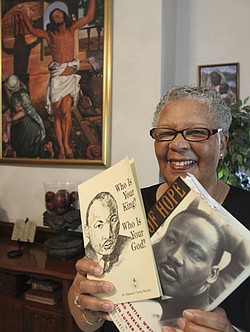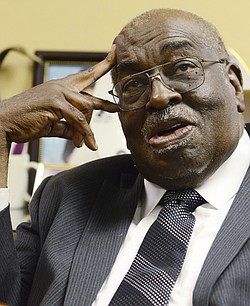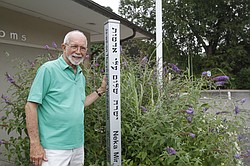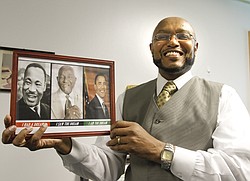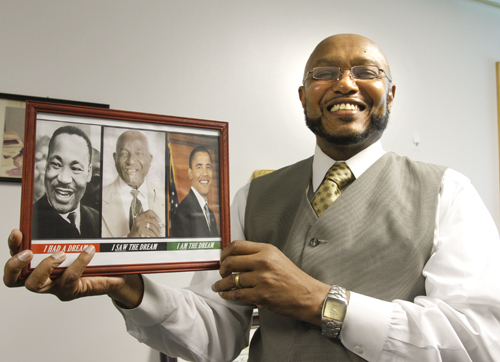
RELATED:• Famous lines from 'Dream' speech
* MLK CELEBRATION | Events and other comments
• MLK memorial work to be finished for anniversary
By LINDA M. LINONIS
linonis@vindy.com
YOUNGSTOWN
The life, death and legacy of the Rev. Dr. Martin Luther King Jr. had an impact on people of his time and succeeding generations.
His ideals for civil rights encompass all. Four Valley clergy, all influenced by King, share their stories in this 50th anniversary year of King’s “I Have a Dream” speech that he delivered Aug. 28, 1963, in Washington, D.C.
THE REV. GENA THORNTON
The Rev. Gena Thornton says MLK's 'Dream' speech drew her to become a minister.
Ironically, it was King’s death that changed the life of the Rev. Gena Thornton.
The mother of two at the time was working at Republic Steel, where she was the first black woman hired as a clerk-typist in the engineering department, and building a life with her husband, Robert. “I didn’t feel involved [with civil rights],” she said.
That changed on April 4, 1968, the day King was assassinated. “I’ve told the story many times,” the Rev. Mrs. Thornton said.
Her husband was working afternoon turn at Youngstown Sheet and Tube Co. while she was at home putting her two daughters in the bathtub. “I turned to put on the radio, which I always did, and heard the news,” she recalled. The girls never got a bath; she put them to bed then watched the news of King’s death unfold on television.
“Something nudged me on the shoulder, and I heard the words ‘wake up’,” she said. “I knew something happened but I wasn’t sure what,” Mrs. Thornton said. “I felt a spiritual pulling.”
Mrs. Thornton said she believes it was “the spirit of God” and promised herself she would do what God showed her. “His death [King’s] somehow involved me ... it was an awakening,” she said.
She acted on a calling to the ministry. In 1976, she became licensed by the late Rev. Lonnie Simon, pastor emeritus of New Bethel Baptist Church, and was ordained in the Baptist denomination in 1979.
“But no Baptist church would call me,” she said.
She took another route to the pastorate by studying in the African Methodist Episcopal Church. Mount Moriah AME Church in Maple Heights called her as pastor in 1987, then she served at St. Paul AME Church in Cleveland. She became pastor at Grace AME Church in Warren in October 2009 and serves there.
THE REV DR. MORRIS W. LEE
The Rev. Morris Lee
In the 1950s, the Rev. Dr. Morris W. Lee attended
Virginia Union University in Richmond, Va., where he majored in history and education, receiving a bachelor’s degree, and then a master of divinity degree. There, he also met Dr. Martin Luther King Jr., then pastor of Dexter
Avenue Baptist Church in Montgomery, Ala. King was at the university to present a seminar.
“He spent a week with students,” Dr. Lee recalled. “I was impressed with his brilliance and language skills. He came across as highly educated and a skilled and gifted orator.”
Dr. Lee admitted that at the time, he saw King as a teacher. “I didn’t realize what he would become.”
But as King gained prominence as he promoted non-violent protests to attain civil rights, Dr. Lee realized “there was no one like him and I followed him.”
The most memorable time, among other protests, was the five-day, 54-mile march from Selma to Montgomery, Ala., to campaign for voting rights.
“I remember the hot sun and the heat of Alabama,” he said. And he recalled that a Confederate flag flew over the Statehouse with the American flag on the side.
“I’ll not forget that,” said the pastor of 53 years at Third Baptist Church.
THE REV. JIM RAY
The Rev. .Jim Ray, now 83, stood the length of a city block away from King as he delivered the “dream” speech in 1963.
The Rev. Jim Ray stood the length of a Youngstown city block away from King as he delivered the “dream” speech. He’d love to have a seat on the Valley bus trip going to the 50th anniversary. But the retired minister, now 83, admits his use of a cane to help
balance a “bum” knee prevents participation.
He recalled the question of physical safety crossed his mind in 1963. After all, he was among about a dozen of white clergy from the North in a predominantly black crowd.
Then, he was in campus ministry at the University of Illinois (he was director of Protestant Campus Ministry at Youngstown State University from 1983-95) when a colleague asked him to go the march. “We drove all night long, found a parking spot and walked to the mall,” he recalled. “The turnout was incredible ... I had never seen such a crowd or so many black people.”
Mr. Ray and his fellow white clergy were among a crowd of an estimated 250,000. “It was claustrophobic with wall-to-wall people,” he said. He remembers clusters of people with signs ... from churches, unions, secular groups ... in the march itself.
“The speech made quite an impression,” he said. The experience in Washington laid the foundation for his lifelong devotion to peace and civil- rights activism.
Two weeks later he found himself on a picket line protesting the lack of black employees at a company in Pennsylvania. His activism took him to Hattiesburg, Miss., to picket at a courthouse and to help register voters in 1964 and to California in 1975 to help organize migrant farm workers. He’s been involved in many protests over the
decades for a variety of social justice causes including the 1965 Selma to Montgomery march for voting rights.
In 1965, he spent a month in Richmond, Va., promoting voter education and registration. The group was housed at a black church.
“You could feel the tension in the air,” he said.
THE REV. KENNETH SIMON
The Rev. Kenneth Simon, pastor of New Bethel Baptist Church in Youngstown, holds a plaque displayed in his office featuring photos of MLK, Simon's father, the Rev. Lonnie Simon and President Barack Obama with the words, “I am the dream.”
The Rev. Kenneth Simon saw struggles and successes firsthand with the civil rights work of his father, the late Rev. Lonnie Simon, pastor emeritus of New Bethel Baptist, where he now pastors.
The elder Simon was a chant leader in the 1963 march on Washington and during 1965 civil-rights marches on Montgomery, Ala., with King. Though his father’s commitment to the civil rights cause influenced him, the Rev. Mr. Simon said, “I was intrigued by King’s life and work when I was a kid.”
He was 8 years old in 1963 when King delivered the “dream” speech. “I was a kid and didn’t understand all that was going on,” he said. “I wondered if he was a troublemaker.”
The more Mr. Simon read about King, the more he said he “understood he was trying to do something good.”
Mr. Simon also recalled that his father would return from marches and tell stories.
He avidly followed any reports on King on TV and newspapers.
The graduate of East High School and Youngstown State University often used King as the topic of papers.
facing prejudice
Mrs. Thornton said in the North, prejudice is more subtle. In the North and in the Mahoning Valley, Mrs. Thornton said, there were “red-lined districts” where blacks could live. Trying to buy a house outside that district was impossible because banks wouldn’t give a loan, she said.
She said she worried about her sons going to different places in the Valley and cautioned them about behavior should they be stopped by police.
Growing up in Portsmouth, Va., Dr. Lee experienced blatant discrimination. He said he didn’t understand why there was segregation. “Things were the way they were,” he said.
“When I was boy, I rode in the back of the bus and in front on the train,” he said. The wood- and coal-burning engines spewed out soot and cinders on the front cars, he said. “The white folk were in the back,” he said.
Another piece of segregation amused him. There were white ladies and men’s rest rooms, he remembered, but colored women and men’s toilets. “I laughed about the expenditures,” Dr. Lee said.
As for school, he recalled passing three “white” schools before he arrived at his “black-only” school. He was bothered because white children could sit at the soda fountain at Woolworth’s and Kresge’s, and he couldn’t.
Portsmouth, located across from Norfolk, Va., on the Elizabeth River, saw many returning veterans after World War II. “My father worked in the shipyard,” he said. Returning black veterans wanted fair treatment in the United States, Dr. Lee said, and that stirred the civil rights movement in the National Association for the Advancement of Colored People and National Urban League.
Mr. Ray’s peace and civil rights activism led to “making connections to the larger picture.”
“It’s a broader understanding of what life is like and what some people are up against all the time,” he said.
Mr. Simon said his father’s activism in the Valley had a price. “Threatening phone calls were made to the house,” he said, and the Simons’ car was bombed in the 1960s.
From King and his father, Mr. Simon learned that
devoting one’s life to working for social justice was fulfilling but hard work. He
experienced discrimination and saw it affect others.
“I saw blacks treated differently,” he said. He recounted being stopped by police late one night as he was returning home after visiting his father in the hospital.
When his clergy license plate was noticed, the attitude changed.
The elder Simon left a
legacy of campaigning for social justice, and his son took up that cause.
“If I see an injustice, I want to take an active part in dealing with it,” he said. Mr.
Simon did that as civil rights chairman in the union at General Fireproofing, where he worked on the assembly line and as a materials coordinator while at YSU.
“I did see firsthand disparate treatment of blacks in discipline and hiring,” he said.
king as a prophet
Mrs. Thornton described King as a prophet who dreamt about freedom. “He was sent as a prophet in our day to show people the way,” she said. “God sends such people to make us look at ourselves, and that’s what Dr. King was.”
“He was a prophet for America and wanted life to be better. But you can’t legislate morality,” Dr. Lee said.
Mr. Ray likened King to an Old Testament prophet.
“They were God’s spokesmen for the people of God,” he said. King mirrored God’s concern about the state of his people.
faith perspective
Why be involved in sometimes dangerous situations of protests?
“As a person of faith, it made sense,” Mr. Ray said. “Standing up against prejudice,
hatred and racism is what being a Christian is all about.”
Mr. Simon, pastor at New Bethel since 1996, said King pushed pastors to be involved because black churches were a foundation on which to
“rally people and mobilize.” He also believes churches must be voices in social,
political and education issues. “It has to be more than services,” he said.
Mr. Simon is part of a group working to establish a faith-based credit union to help minorities financially and is working with the American Petroleum Institute to place more minority employees in the skilled trades.
the dream
Mrs. Thornton said she holds onto hope that things will continue to change. She said affirmative action has created opportunities in
education and employment that previously didn’t exist for minorities, women and others.
“It’s opened doors,” she said. “Whatever helps one, helps all.”
She added she felt the civil rights movement helped white women in the workplace. “Our struggle opened doors, and others profited,” she observed.
Mrs. Thornton said that federal agenda helped “move her generation into the middle class” because of the new opportunities available. But 40 years of affirmative action is short compared to 300 years of oppression and discrimination, she said. “My children have inherited the ability to be in the middle class. That wouldn’t be the case without the sacrifices of people whose names we don’t know.”
Mrs. Thornton said education and employment are the key elements.
“We just have to move faster,” she said. “There is hope.”
“I see the dream as a process,” Dr. Lee said, adding it has not reached fulfillment though positive changes have occurred. At times, he feels that blacks “are going backwards” because some are “caught up in substance abuse” and others “feel abandoned by society.”
Dr. Lee said these
problems, which contribute to the dream not being realized, need to be addressed and solved by the black
community.
“We need to have more understanding of what King did,” he said.
Dr. Lee reiterated, “The dream is still in process. Times have changed, and they continue to change.”
Mr. Simon said Americans must have “intentionality,” that is, dealing purposefully with race issues to solve them. Education and diversity must be valued. “Society can’t survive or thrive with racial divide,” he said.
“We need to stay focused on keeping the dream alive,” Mr. Simon said. Educating young people is key.
Mr. Ray believes attaining “the dream” of King’s speech “has a long way to go.” He is concerned that inequality is “getting worse because of the economy.” He said “the poor get poorer” and the “middle class is waning.” His activism, he said, has given him “some sense of what it is like to be disenfranchised.”
Mr. Ray believes affirmative action has made a difference and should inspire individuals to do the same. Though he supports the federal agenda, he believes the simple act of mingling with people different from ourselves on a regular basis will achieve peace.
“Getting to know one
another and understanding is the key,” he said. “That will get us to where we need to be.”
regressing
Mr. Simon said the current trend, which seems to be putting up barriers for people to vote, is a backward step.
“My Dad used to say we don’t have money or an economic base, but we have the collective vote to protest.”
Mr. Simon said these are tenuous times. With voter identification issues and the verdict in the Trayvon Martin case, it can seem as if the clock is turning backwards.
“We have the same social justice and education issues,” he said. “My passion is to make a difference by educating people.”
 43
43

